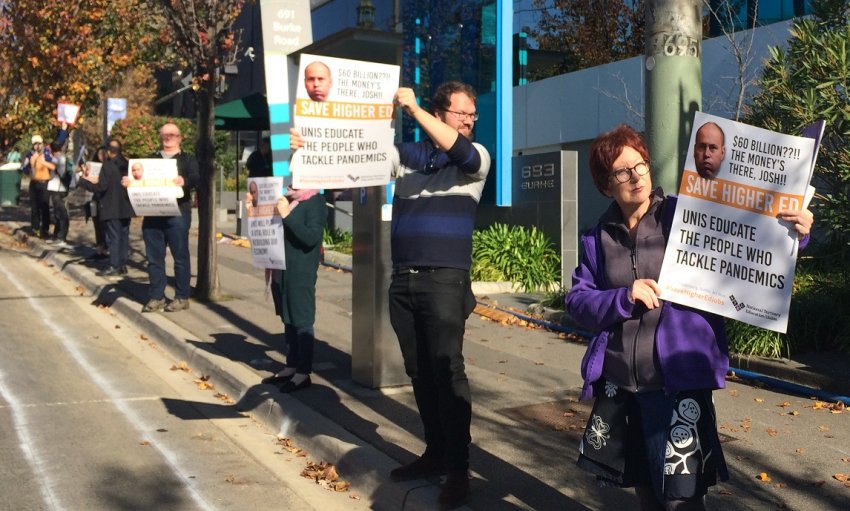
The COVID-19 shutdown has provided the federal government and university managements with the perfect opportunity for their “shock doctrine” approach to the sector — cutting university workers’ wages and conditions and further corporatising higher education.
The immediate response of some Vice Chancellors to the coronavirus-inspired border closures was to target the most vulnerable staff — casualised and precarious workers — by cutting courses and classes. Other VCs have used the moment to push ahead with major restructures, which are likely to lead to job losses and even some campus closures.
Despite the significant drop in international student enrolments and accompanying falling revenue, the federal government — on three separate occasions — has excluded higher education sector workers in public universities from accessing JobKeeper.
Treasurer Josh Frydenberg on May 25 reinforced the government’s ideologically-driven approach telling private universities that they would be given access to the wage subsidy scheme.
The COVID-19-inspired recession is exacerbating an already dire shortage of funding for the sector. This is the result of decades of cuts, worsening staff-student ratios, and a deliberate reliance on casuals to deliver education and research outcomes.
The corporatisation of the sector has been accompanied by a conscious effort to encourage university managements to see themselves as CEOs and senior executives.
Cracks widen
The cracks in the sector have been widening since free education was abolished in the late 1980s under the Hawke Labor government. By the 1990s, the Whitlam-led reforms had been junked and Labor education minister John Dawkins’ neoliberal reforms positioned higher education as a major new export earner.
For 30 years, deregulation and funding cuts have forced the sector into an unsustainable competition for students and research funding, and a reliance on fee-paying international and domestic students.
COVID-19 has exposed just how fragile and susceptible to disruption higher education has become.
The National Tertiary Education Union’s (NTEU) attempt to negotiate a national Jobs Protection Framework, which included trading off pay and conditions ostensibly to keep jobs, generated disquiet and then growing opposition among union members, despite being endorsed by a large majority of the union’s national councillors.
In addition, very few university managements were prepared to sign on: 17 VCs refused, although their reasons had little to do with the union debate over how to best protect jobs. VCs were concerned to keep their books closed from union and public scrutiny, and to opt for deeper job cuts than the union framework allowed for.
Melbourne University management has since announced a non-union ballot to scrap a 2.2% pay rise that workers had already received.
Deakin University said on May 25 that it will cut 400 jobs, including 300 academic and administrative staff and 100 positions that are vacant.
This followed Central Queensland University’s decision on May 22 that it would not sign the union’s framework agreement, but would instead push on with VC Nick Klomp’s “restructure” which includes job cuts that started last year.
Framework vote abandoned
NTEU members were about to vote on the framework, in a national plebiscite, when on May 26 national officers Alison Barnes, Matthew McGowan and Gabe Gooding announced that the framework was “no longer viable”.
However, they said members at those few institutions which had signed up to the Framework (such as the University of Western Australia) would still be balloted.
In an email to members, they affirmed the union would “vigorously oppose any non-union ballot to vary Enterprise Agreements” and would now “escalate industrial and campaign activities to fight for every job”.
They made an appeal “to come together as never before to protect the sector and the livelihoods of thousands of higher education workers” and said the union would “leave no stone unturned” to protect higher education jobs and fight for the sector’s future.
From early April, union members were expressing concern that the officials’ framework signalled to management that the union was open to trade-offs, rather than focus on a campaign to save jobs and pressure the federal government to fund the sector.
As details of the proposed framework were released, this movement gained momentum. Several NTEU branches voted to reject the framework and the national leadership was criticised for their hasty deal with university administrations ahead of thorough membership consultation.
NTEU national president Alison Barnes said on May 26 that: “The NTEU will now escalate to what will be historically high levels of industrial disputation and campaigning to fight for every job. This could have been avoided. We have demonstrated that we are the only body that is prepared to provide leadership to fight for the future of the sector and its 200,000 employees.
“NTEU members will now continue to ramp up their campaign against the federal government and the Vice Chancellors who have abandoned their workforce.”
Union activists who rejected the Framework negotiating strategy have welcomed the leadership’s turn. They are keen to join a vigorous campaign to defeat any non-union ballots, to defend jobs and conditions during and after the COVID-19 crisis, and deepen and extend the union's organising work.
This campaign will have to involve industrial action, days of protest and events to build student and community support. Such a campaign would provide the best opportunity to build the union’s numbers and power so that it can push for higher education to be fully publicly-funded, accessible and socially engaged, and for universities to be workplaces with secure jobs.
Our universities need to be reclaimed as the public institutions they were intended, for the benefit of society and our planet, not corporate profits.
[Susan Price is an NTEU member, a former NTEU University of NSW branch president and a former national councillor.]